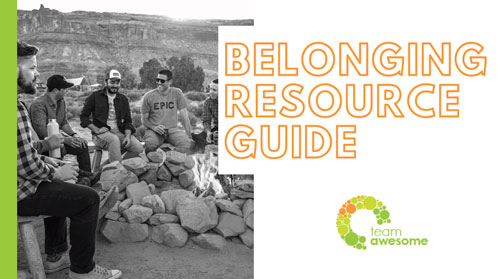Let me begin by saying that I love and respect the work we are doing in diversity & inclusion. I think it is noble and necessary work. And, I think sometimes we are spiking the ball at the 10-yard line and calling it a touchdown. Our organizations are talking about diversity and inclusion, and perhaps taking some intentional steps in that space, but we are not getting the outcome that we hope to out of that work. The outcome that we are looking for is belonging.
The nature of diversity is tolerating differences with coexistence. We put lots of different people together. When we move towards inclusion, tolerating differences becomes respecting differences. For the first time, we begin to look at how people work together, not just next to each other. Where we want to go is to actually create the space where people feel like they belong.
I can already feel a shift in this topic just by focusing on a sense of belonging. What is that? Can you name it?
And that is the heart of the matter. I urge our organizations to get out of our heads and into our hearts. For us to build organizations that are heart-centered and human-focused, where differences and intersectionality of all kinds are embraced.
“We go to work in search of belonging”
Try this on for size. I believe that we go to work in search of belonging. We especially learn this as we get older, and our time becomes more precious and if we are going to spend 40-50 hours a week doing anything it better fill our cup with more than a paycheck. Especially after having kids, my time is clearly my most precious resource and I am painfully aware when I don’t feel like my time is spent on things of value. The last thing anyone needs (kids or not) is to spend most of their waking hours feeling like an outsider but beholden to the pay you promised them.
What makes up belonging?
Belonging may show up differently for everyone, but here are a few elements that I think are important to feeling as if you are a true part of something:
- A feeling of trust
- Human caring
- Commonality or shared experiences
- Self-awareness and social awareness
- Commitment to the community
So, what does belonging feel like? Everyone experiences belonging differently, but we all know what that FEELS like. It feels safe. Whole. Home. Like love. And these are words that we NEVER use when describing work!
It is important to note that this is different than fitting in. In Brené Brown’s book, The Gifts of Imperfection, she says, “fitting in and belonging are not the same thing, and, in fact, fitting in gets in the way of belonging.” This is because fitting in means assimilating ourselves towards the norms of the group. Belonging means you are loved and accepted just as you are, and that you can bring your whole, unchanged self to the group.
Perhaps we haven’t had the words for this, but deep down we already know this about our workplaces. We know because we spend millions of dollars annually to get to the bottom of our turnover or measure engagement scores with survey data. And the feedback is clear. We leave our bosses when we don’t feel safe. We measure engagement surveys that ask if we have a best friend at work or if we feel supported by co-workers. As employees or job seekers, we look for companies that align with our values.
I believe that each individual leader is the biggest opportunity that we have to affect people’s work experience. And frankly, the data isn’t positive. Gallup estimates that the manager accounts for at least 70% of the variance in employee engagement scores across business units. One in two people they surveyed have left their job to get away from their manager (State of the Manager Report, Gallup).
But I don’t claim that managers are always to blame. I think our biggest miss is that we promote people to leadership roles drastically underprepared without the training or resources to be able to effectively manage people, culture, and a sense of belonging.
How do we do this?
What got us here won’t get us there. Employees expect more from us now. As the largest generation now in the workforce, Millennials are especially aware that they can expect good leadership and inclusive companies, and they are willing to ask for it or leave to find it. I believe these are all things that we have always wanted and needed as human beings, but in previous generations, the conditions were not ripe for the workforce to demand this from work. The world has shifted, and we have to catch up.
How do we take something big and fluffy like belonging and actually do something with it? We have to build the organization for belonging and measure for belonging. We have to ask for feedback on this subject that we probably don’t want to hear. And then (and this is a MUST) you must do something with the feedback. Don’t ask if you aren’t going to take action.
We have to ensure that all leaders are taught how to foster belonging and are expected to be inclusive leaders. All too often we check a box but let leaders slide when they act outside of belonging and inclusivity.
If we want people to feel safe, then mistakes don’t exist. We don’t cast judgement making mistakes unpalatable.
If we want people to feel love, then systems and behaviors have to put humans ahead of stuff.
If we want people to feel whole, then we have to bring our whole selves to work, just as we are.
When we do that, it is fireworks. People stay, they do anything, they recruit their friends. When we don’t, we erode connection and belonging. When we kill people’s souls slowly with conference calls we ruin belonging. When managers break trust and groups break psychological safety, we ruin belonging.
The talent war is too great to win by playing dead. You will lose. And frankly, we deserve better. Our organizations have to move beyond diversity and inclusion to belonging, and every leader plays a role in creating those small moments that add up to belonging. Everything we do is an opportunity to intentionally create belonging and purpose. If not then make way for leaders that are ready to make the workplace a place that feels safe, whole and home.
About the author:
Katie Rasoul is the Chief Awesome Officer for Team Awesome, a leadership coaching and culture consulting firm. She is a TEDx speaker alumna, author of the best-selling book, Hidden Brilliance: A High-Achieving Introvert’s Guide to Self-Discovery, Leadership and Playing Big, and co-host of The Life and Leadership Podcast.
Find out more by visiting www.teamawesomecoaching.com or join the Team Awesome Community for awesomeness coming straight to your inbox. Follow Team Awesome on Instagram, Facebook and Twitter.
See more about Katie’s keynote presentation on this topic, “Moving Beyond Diversity and Inclusion to Belonging” here.



Recent Comments